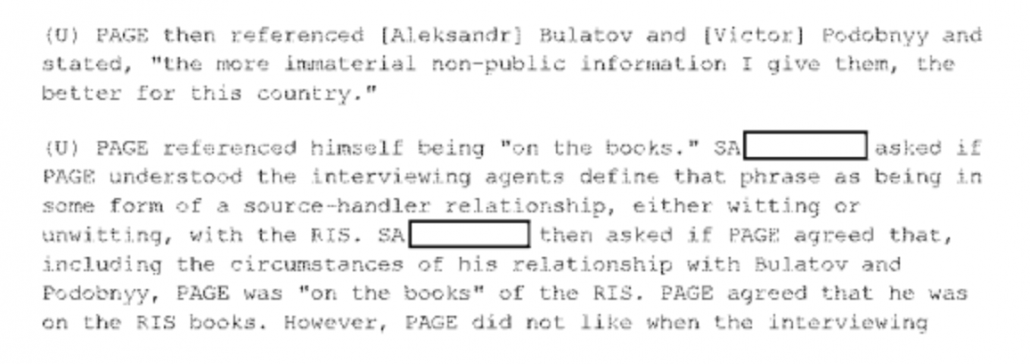The FISA Court just declassified an order — issued on January 7 — revealing that along with the previously released December 9 order listing problems with the Carter Page applications, DOJ also reassessed its previous probable cause assessment.
DOJ assesses that with respect to the applications in Docket Number 17-375 and 17-679, “if not earlier, there was insufficient predication to establish probable cause to believe that [Carter] Page was acting as an agent of a foreign power.”
[snip]
The Court understands the government to have concluded, in view of the material misstatements and omissions, that the Court’s authorizations in Docket Numbers 17-375 and 17-679 were not valid. The government apparently does not take a position on the validity of the authorizations in Docket Numbers 16-1182 and 17-52, but intends to sequester information acquired pursuant to those dockets in the same manner as information acquired pursuant to the subsequent dockets.
The function of this January 7 order is to demand that FBI follow up on a previous agreement to “sequester all collection the FBI acquired pursuant to the Court’s authorizations in the above-listed four docket numbers targeting [Carter] Page pending further review of the OIG Report and the outcome of related investigations and any litigation,” to explain how it is doing so, how it has chased down all information collected pursuant to the Page orders, and why it needs to keep the data at all.
The reason it needs to keep the data, incidentally, is in case it is sued or John Durham decides to prosecute someone (including Kevin Clinesmith, who altered an email that was used as back-up to the final renewal application) or Page decides to sue. Indeed, one of the most unprecedented aspects of this order is that the docket numbers have been declassified, which will make FOIAing the records far easier.
Which is probably what the only substantive redaction remaining in the order pertains to: the possibility that someone will be held liable under FISA for illegal surveillance.
A lot of people are assuming that DOJ took this stance only because Bill Barr wanted to prove that Trump was illegally wiretapped (which would only be true if he was in direct contact with Page, which everyone has denied). That’s certainly possible!
But it’s quite possible that DOJ and FBI feel the need to be proactive on this point and FISC — particularly given the letters it has received from Congress — feels the need to look stern. Moreover, it is in everyone’s interest for DOJ to withdraw at least the last application (the one influenced by Clinesmith’s actions). It’s an important precedent, and there’s no reason Carter Page’s personal data should be floating around the FBI after discovering he was improperly surveilled. This doesn’t mean the FBI didn’t have reason to investigate Page. In a March 23, 2017 interview, after all, Carter Page was quite clear he knew he was being recruited by Russian intelligence officers and he believed the more immaterial non-public information he gives them, the better off we are.
But, first of all, he wasn’t hiding his happiness to share information with Russian spies, meaning he wasn’t acting in the clandestine matter that would merit a FISA order. And by April 2017, it was pretty clear that the Russians had lost all interest in recruiting Page.
In any case, FISC’s demand for what the government is doing with the data is not unusual. Similar things have happened virtually every other time the government did something improper.
There’s one more important lesson, though: Even from the start, people raised questions about whether the applications targeting Page were prudential. By the third application — the first one being withdrawn — there were not only real questions about whether it would yield anything more, but whether Page was central enough to their investigation to want to surveil him. Had the FBI simply not pursued surveillance it questioned whether it really needed, the worst revelations of the IG Report would have been avoided.
So one of the lessons of this whole fiasco is that the FBI would benefit from giving greater consideration about whether its most intrusive methods are necessary.

